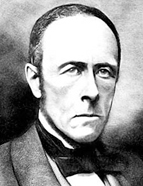

In his old age, Herculano would look back on his short-lived freemasonry experience as one of his “boyish exploits” (Cartas, I, 10), but his political impetuosity would give rise to serious consequences. He would have to flee the country, first to Plymouth and later to Rennes, joining the network of liberal exiles who would shortly after play a decisive role in the fight against D. Miguel’s partisans. In March 1832, Herculano arrived in the Azores and joined the Batalhão dos Voluntários da Rainha [the Queen’s Volunteer Battalion], and in July he disembarked on mainland Portugal together with 7,500 men led by D. Pedro, in a move which proved to be decisive for the fate of the liberal movement.
With the liberal government established at the end of the Civil War, Herculano was appointed librarian of the newly founded Biblioteca do Porto [Library of Oporto], where he acquired major skills as an archivist and where he participated in projects with a view to publishing historical sources, particularly Crônica de D. Sebastião [Chronicle of King Sebastião], authored by Friar Bernardo da Cruz and edited in 1837 as a result of the comparison of six handwritten versions. Herculano had shortly before published two theoretical essays on Portuguese literature and literary aesthetics, the first works on his path to becoming a polemicist, where he formulated a political-aesthetic intervention agenda in the national culture, in line with the general precepts of Romanticism and liberalism. (Macedo, A. Herculano: polémica e mensagem, [A. Herculano: Polemic and Message] 34-35). Herculano resigned from his post as librarian in Oporto in 1836, unhappy with the political line followed by the government which had stemmed from the Revolução de Setembro [the September Revolt] and which had reinstated the 1822 Constitution. This Constitution was more restrictive of royal powers and more welcoming of democratic principles, when compared to the 1826 Carta Constitucional [Constitutional Charter] which Herculano did not wish to renounce – at least until the compromise solution reached in 1838. (Canotilho, “As constituições” [“The constitutions”]) He voiced his dissatisfaction and restated his loyalty to the Carta in a political-poetic irate pamphlet that resonated strongly with the public of the time: A voz do profeta [The voice of the prophet] (Reynaud, “Herculano, poeta profeta” [“Herculano, poet prophet”], 29-35).
The popularity that writing afforded him most surely facilitated the invitation in 1837 to head the newsroom of the weekly newspaper O Panorama [Panorama], edited in Lisbon under royal patronage and inspired by the London Penny Magazine, by the Sociedade Propagadora dos Conhecimentos Úteis [Society for the Dissemination of Useful Knowledge]. In 1838, he was director and writer of the unofficial part of Diário do Governo [the Government Gazette] (Baptista, A. Herculano Jornalista [A. Herculano Journalist], 15; 22; 77).
